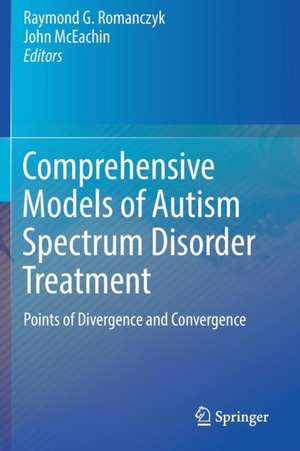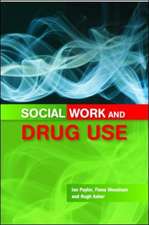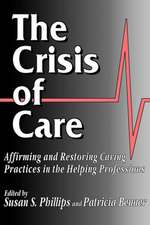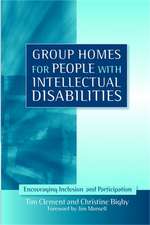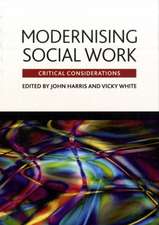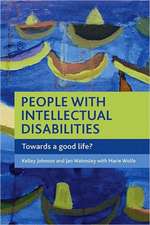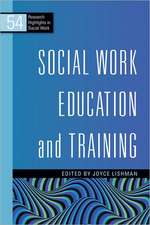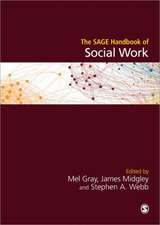Comprehensive Models of Autism Spectrum Disorder Treatment : Points of Divergence and Convergence
Editat de Raymond G. Romanczyk, John McEachinen Limba Engleză Paperback – 7 sep 2017
This book presents proceedings from the joint conference, Evidence and Rationales for Comprehensive Models of Autism Spectrum Disorder Treatment: Divergence and Convergence, sponsored by the Council on Autism Services and the Autism Partnership. It addresses the growing need for, and current lack of, effective services for children with autism spectrum disorder (ASD) and compares several key evidence-based interventions. Chapters examine various approaches to ASD treatment, including key concepts, goal development, procedures, and staffing.
This unique volume explores fundamental similarities and differences among leading treatment models; discusses the challenges of implementing programs, educating parents, training staff, and funding issues; and speaks to the need for more meaningful collaboration in this multidisciplinary field. Using an integrative perspective, new tools are presented to help readers make informed choices about how to select and advocate for specific treatments and develop individualized interventions for improved outcomes for children with ASD.
Featured topics include:
- The Lovaas Model.
- The Early Start Denver Model.
- The New England Center for Children’s Autism Curriculum Encyclopedia (ACE®).
- The value of applied behavior analysis (ABA) as a treatment for autism.
- Implementation parameters for ASD treatments.
Comprehensive Models of Autism Spectrum Disorder Treatment is an essential resource for clinicians, practitioners, applied behavior analysts, therapists, educators, and administrators as well as researchers and graduate students in school, clinical child, and developmental psychology, behavior therapy, special education, social work, child and adolescent psychiatry, rehabilitation medicine/therapy, and pediatrics.
| Toate formatele și edițiile | Preț | Express |
|---|---|---|
| Paperback (1) | 521.26 lei 6-8 săpt. | |
| Springer International Publishing – 7 sep 2017 | 521.26 lei 6-8 săpt. | |
| Hardback (1) | 640.24 lei 6-8 săpt. | |
| Springer International Publishing – 25 aug 2016 | 640.24 lei 6-8 săpt. |
Preț: 521.26 lei
Preț vechi: 613.25 lei
-15% Nou
Puncte Express: 782
Preț estimativ în valută:
99.76€ • 103.05$ • 83.02£
99.76€ • 103.05$ • 83.02£
Carte tipărită la comandă
Livrare economică 25 martie-08 aprilie
Preluare comenzi: 021 569.72.76
Specificații
ISBN-13: 9783319681474
ISBN-10: 3319681478
Pagini: 149
Ilustrații: XVIII, 149 p. 54 illus., 42 illus. in color.
Dimensiuni: 155 x 235 mm
Greutate: 0.25 kg
Ediția:1st ed. 2016
Editura: Springer International Publishing
Colecția Springer
Locul publicării:Cham, Switzerland
ISBN-10: 3319681478
Pagini: 149
Ilustrații: XVIII, 149 p. 54 illus., 42 illus. in color.
Dimensiuni: 155 x 235 mm
Greutate: 0.25 kg
Ediția:1st ed. 2016
Editura: Springer International Publishing
Colecția Springer
Locul publicării:Cham, Switzerland
Cuprins
Chapter 1. Prologue and Introduction.- Chapter 2. The Lovaas Model: Love It or Hate it, but First Understand It.- Chapter 3. Early Start Denver Model.- Chapter 4. The New England Center for Children: Applied Behavior Analysis for Treating All Levels of ASD Severity.- Chapter 5. The Value of a Behavior Analysis of Language for Autism Treatment.- Chapter 6. Panel Discussion.- Chapter 7. Commentary on Commonalities and Divergence.- Chapter 8. Audience Questions and Closing Comments.- Chapter 9. ASD Treatment Implementation Parameters and Fidelity.
Notă biografică
Raymond G. Romanczyk is a SUNY Distinguished Service Professor in the Clinical Psychology program at Binghamton University. He is a NY Licensed Behavior Analyst, NY Licensed Clinical Psychologist and a Board Certified Behavior Analyst - Doctoral and received his Ph.D. from Rutgers University. In addition, Dr. Romanczyk is an Adjunct Professor of Psychiatry of the SUNY Health Sciences Center of Syracuse. Dr. Romanczyk is the founder and director of the Institute for Child Development that has been providing clinical and educational services to children and families for 40 years, and is one of 10 programs cited in the Educating Children with Autism report of the National Research Council.
He is a Fellow of the American Psychological Association and he is a founding board member of the Association of Professional Behavior Analysts, was a member of the scientific advisory board of the National Autism Center, and a founding board member of the Council on Autism Services, a national organization of directors of autism service agencies. He is a consultant to the NYS Department of Health Early Intervention Program and was a panel member on the NYSDOH clinical guidelines for autism, one of the first empirically based reviews of autism assessment and treatment practices. He also serves as an associate editor and member of the editorial board and reviewer for numerous professional journals. Recent published works include “Efficacy of Behavioral Interventions for Young Children with Autism Spectrum Disorders: Public Policy, the Evidence Base, and Implementation Parameters” and “The Status of Treatment for Autism Spectrum Disorders: The Weak Relationship of Science to Interventions”. Dr. Romanczyk has presented several hundred addresses at regional, national, and international professional conferences regarding his applied and research work at the Institute, and has received numerous awards for his clinical and research accomplishments.
John McEachin is a behavior analyst and licensed psychologist who has been providing intervention to children with autism as well as adolescents and adults with a wide range of developmental disabilities since 1977. He received his graduate training under Professor Ivar Lovaas at UCLA on the Young Autism Project. During his 11 years at UCLA, Dr. McEachin served in various roles including Clinic Supervisor, Research Assistant and Teaching Assistant. His research has included the long-term follow-up study of the participants in the Young Autism Project, which was published in 1993. In 1994 he joined with Ron Leaf in forming Autism Partnership, which they co-direct. In 1999 they published A Work in Progress, a widely used behavioral treatment manual and curriculum for children with autism. Dr. McEachin has lectured throughout the world and co-authored numerous books and research articles. He consults regularly to families, agencies, and school districts, assisting in the development of treatment programs and providing training to parents, group home staff, and classroom personnel.
Textul de pe ultima copertă
This book presents proceedings from the joint conference, Evidence and Rationales for Comprehensive Models of Autism Spectrum Disorder Treatment: Divergence and Convergence, sponsored by the Council on Autism Services and the Autism Partnership. It addresses the growing need for, and current lack of, effective services for children with autism spectrum disorder (ASD) and compares several key evidence-based interventions. Chapters examine various approaches to ASD treatment, including key concepts, goal development, procedures, and staffing.
This unique volume explores fundamental similarities and differences among leading treatment models; discusses the challenges of implementing programs, educating parents, training staff, and funding issues; and speaks to the need for more meaningful collaboration in this multidisciplinary field. Using an integrative perspective, new tools are presented to help readers make informed choices about how to select and advocate for specific treatments and develop individualized interventions for improved outcomes for children with ASD.
Featured topics include:
- The Lovaas Model.
- The Early Start Denver Model.
- The New England Center for Children’s Autism Curriculum Encyclopedia (ACE®).
- The value of applied behavior analysis (ABA) as a treatment for autism.
- Implementation parameters for ASD treatments.
Comprehensive Models of Autism Spectrum Disorder Treatment is an essential resource for clinicians, practitioners, applied behavior analysts, therapists, educators, and administrators as well as researchers and graduate students in school, clinical child, and developmental psychology, behavior therapy, special education, social work, child and adolescent psychiatry, rehabilitation medicine/therapy, and pediatrics.
Caracteristici
Explores the pressing demand for effective autism interventions
Describes conceptual and stylistic differences in implementation across various models and the need for replication studies
Compares approaches to theory, evidence, implementation resources, and strengths and limitations
Addresses the role of parents and caregivers in interventions
Discusses levels of staffing expertise, certification, and licensing required
Includes supplementary material: sn.pub/extras
Describes conceptual and stylistic differences in implementation across various models and the need for replication studies
Compares approaches to theory, evidence, implementation resources, and strengths and limitations
Addresses the role of parents and caregivers in interventions
Discusses levels of staffing expertise, certification, and licensing required
Includes supplementary material: sn.pub/extras
